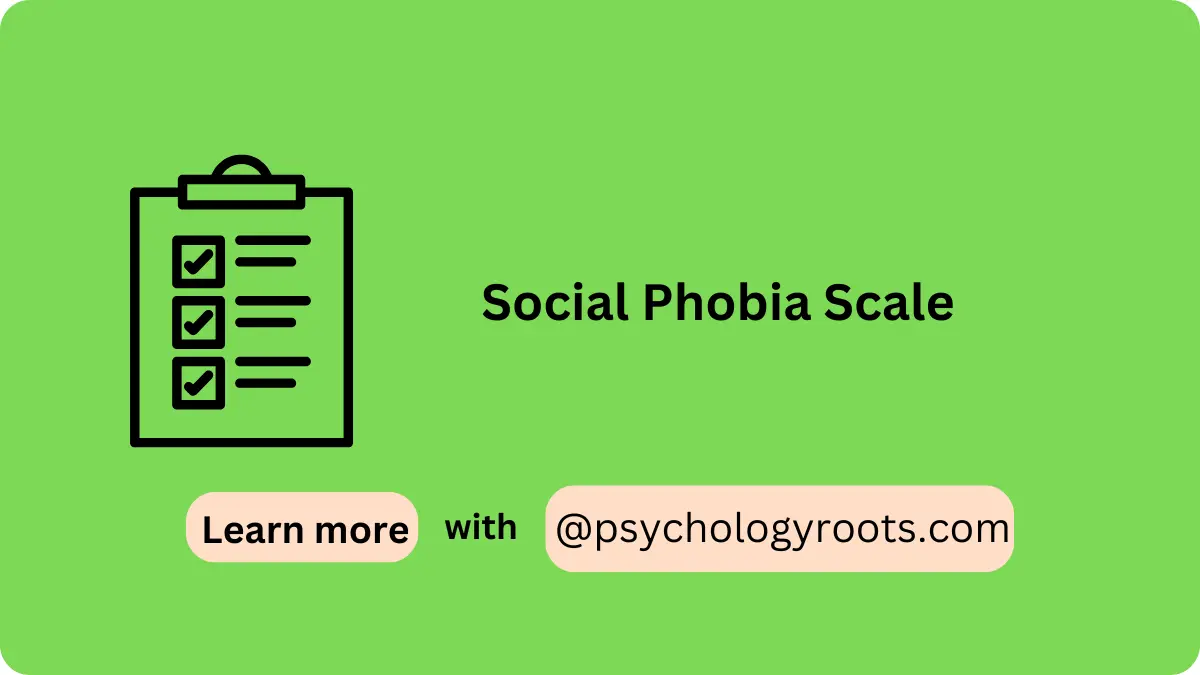Table of Contents
Social Phobia Scale
Here in this post, we are sharing the “Social Phobia Scale”. You can read psychometric and Author information. We have thousands of Scales and questionnaires in our collection (See Scales and Questionnaires). You can demand us any scale and questionnaires related to psychology through our community, and we will provide you with a short time. Keep visiting Psychology Roots.
About Social Phobia Scale
Scale Name
Social Phobia Scale
Author Details
Richard P. Mattick and J. Christopher Clarke
Translation Availability
English

Background/Description
The Social Phobia Scale (SPS) is a meticulously crafted self-report instrument designed to assess the fear of being scrutinized or negatively evaluated in social or performance situations, a hallmark of social anxiety disorder (SAD). Developed in 1998 by Richard P. Mattick and J. Christopher Clarke, the SPS was introduced alongside its companion measure, the Social Interaction Anxiety Scale (SIAS), to provide a comprehensive evaluation of social anxiety. The SPS specifically targets scrutiny fears, such as being observed while eating, writing, or performing tasks, distinguishing it from broader social interaction anxieties. Its development responded to the need for a precise tool to capture this unique aspect of social phobia, aligning with DSM-IV criteria and supporting both clinical practice and research.
Comprising 20 items, the SPS uses a 5-point Likert scale (0 = “not at all” to 4 = “extremely”) to gauge the intensity of discomfort in situations involving potential observation. Sample items include “I get nervous that people are staring at me as I walk down the street” and “I become anxious if I have to write in front of other people.” Total scores range from 0 to 80, with higher scores indicating greater scrutiny fear. Validated with clinical and community samples, the SPS excels in identifying individuals with social anxiety disorder and tracking symptom changes, particularly in response to interventions like cognitive-behavioral therapy (CBT) or pharmacotherapy.
Psychologists value the SPS for its specificity and ease of use, offering insights into how scrutiny fears impair daily functioning, from public speaking to casual encounters. Its clear focus enhances diagnostic accuracy and treatment planning, while its translations broaden its reach across cultures. By illuminating a critical dimension of social anxiety, the SPS equips clinicians to empower individuals to confront and overcome their fears with targeted strategies.
Administration, Scoring and Interpretation
- Obtain a copy of the Social Phobia Scale from a credible psychological source, such as academic journals or licensed distributors, ensuring proper authorization.
- Explain the purpose of the SPS to the respondent, noting that it measures fear of being observed or judged in various situations to better understand their anxiety.
- Provide instructions, asking the respondent to rate each of the 20 statements based on how characteristic it is of them, using the 0-4 scale, over the past week.
- Approximate time for completion is about 5-10 minutes, depending on the respondent’s reading speed and reflection.
- Administer the scale in a quiet, private setting, via paper or digital formats, to promote candid and accurate responses.
Reliability and Validity
The Social Phobia Scale exhibits excellent psychometric properties, reinforcing its utility in assessing scrutiny fears. Internal consistency is robust, with Cronbach’s alpha values typically ranging from 0.89 to 0.94, indicating high item cohesion. Test-retest reliability is strong, with correlations of 0.85 to 0.93 over intervals of 4-12 weeks, as reported by Mattick and Clarke (1998), reflecting stable measurement in untreated samples.
Convergent validity is well-established, with the SPS correlating strongly with other social anxiety measures, such as the Liebowitz Social Anxiety Scale (r = 0.65-0.75) and its companion SIAS (r = 0.60-0.70). Discriminant validity is supported by lower correlations with depression scales, like the Beck Depression Inventory (r < 0.45), and general anxiety measures (r < 0.50), ensuring specificity to scrutiny fears. Criterion validity is demonstrated by its ability to differentiate individuals with social anxiety disorder from controls and its sensitivity to treatment effects, with score reductions post-CBT or SSRIs. These qualities affirm the SPS as a precise and reliable tool.
Available Versions
20-Items
Reference
Mattick, R. P., & Clarke, J. C. (1998). Development and validation of measures of social phobia scrutiny fear and social interaction anxiety. Behaviour research and therapy, 36(4), 455-470.
Important Link
Scale File:
Frequently Asked Questions
What does the SPS measure?
It measures fear of being scrutinized in social or performance situations.
Who can complete the SPS?
Anyone can, but it’s typically used by clinicians for screening or research.
How long does it take to finish the SPS?
It takes about 5-10 minutes.
Does the SPS assess general anxiety?
No, it specifically targets scrutiny fears related to social anxiety.
Can the SPS track therapy progress?
Yes, it’s sensitive to changes from CBT or medication.
Disclaimer
Please note that Psychology Roots does not have the right to grant permission for the use of any psychological scales or assessments listed on its website. To use any scale or assessment, you must obtain permission directly from the author or translator of the tool. Psychology Roots provides information about various tools and their administration procedures, but it is your responsibility to obtain proper permissions before using any scale or assessment. If you need further information about an author’s contact details, please submit a query to the Psychology Roots team.
Help Us Improve This Article
Have you discovered an inaccuracy? We put out great effort to give accurate and scientifically trustworthy information to our readers. Please notify us if you discover any typographical or grammatical errors.
Make a comment. We acknowledge and appreciate your efforts.
Share With Us
If you have any scale or any material related to psychology kindly share it with us at psychologyroots@gmail.com. We help others on behalf of you.